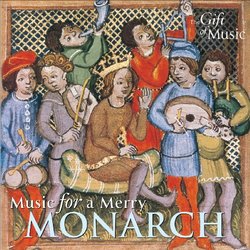| All Artists: Serindipity;The Oxford Girls Choir;The Henrician Consort;and others Title: Music for a Merry Monarch Members Wishing: 2 Total Copies: 0 Label: The Gift of Music Original Release Date: 1/1/2005 Re-Release Date: 3/4/2005 Genre: Classical Style: Symphonies Number of Discs: 1 SwapaCD Credits: 1 UPC: 658592111620 |
Search - Serindipity;The Oxford Girls Choir;The Henrician Consort;and others :: Music for a Merry Monarch
 | Serindipity;The Oxford Girls Choir;The Henrician Consort;and others Music for a Merry Monarch Genre: Classical
Music for a Merry Monarch Cheerful dances and songs from all over Europe of the middle ages and early renaissance. From bear dances to Spanish songs, from brawls to revels, here is a happy, bubbly album for a truly merry m... more » |
Larger Image |
CD Details
Synopsis
Product Description
Music for a Merry Monarch Cheerful dances and songs from all over Europe of the middle ages and early renaissance. From bear dances to Spanish songs, from brawls to revels, here is a happy, bubbly album for a truly merry monarch, being entertained in style with some of the best tunes of the age. For a monarch to be truly merry, he needs music! This album is a selection of cheery medieval music to please a merry monarch. There are several types of medieval music represented and several different instruments, most of which are shown in the fascinating cover illustration. These instruments can be heard on many tracks, but they are perhaps most prominent as follows: lute (track 17), bagpipes (track 5), horn (track 10), string instrument like a viola (track 2) and drums (track 15). These pictures of instrumental players are taken from Arbeau's Orchesographie a fascinating volume of dance instructions and music which was first published in France in 1589. The dances on this album are from an earlier period, but the mood of many of them is well captured in these drawings. The main dance represented on the album is the ductia. Several tracks have this description as a subtitle.The fourteenth century writer Johannes de Grocheo published a treatise on music in Paris in around 1300 in which he described the ductia as a 'light and fast cantilena': in other words, a good tune which moves along quickly! The saltarello is a dance from the 1400s which originated in Italy (track 7). In addition to these dance types, there are Spanish songs on the album which date from the mid-1200s. They are composed by Martin Codax who was a troubadour: traditionally, a troubadour was an entertainer who travelled from court to court throughout Europe, singing, dancing and entertaining. Codax's songs would have been heard in the great hall of many a fine castle. The music is noble and rather grand. The final group of nine pieces, performed by the Henrician Consort, come from all over Europe, and present a great variety of instruments and timbres. The music is mainly from the early sixteenth century.
Similar CDs
| Memories Made New Volume 1 Genres: Country, Gospel | |

 Track Listings (21) - Disc #1
Track Listings (21) - Disc #1